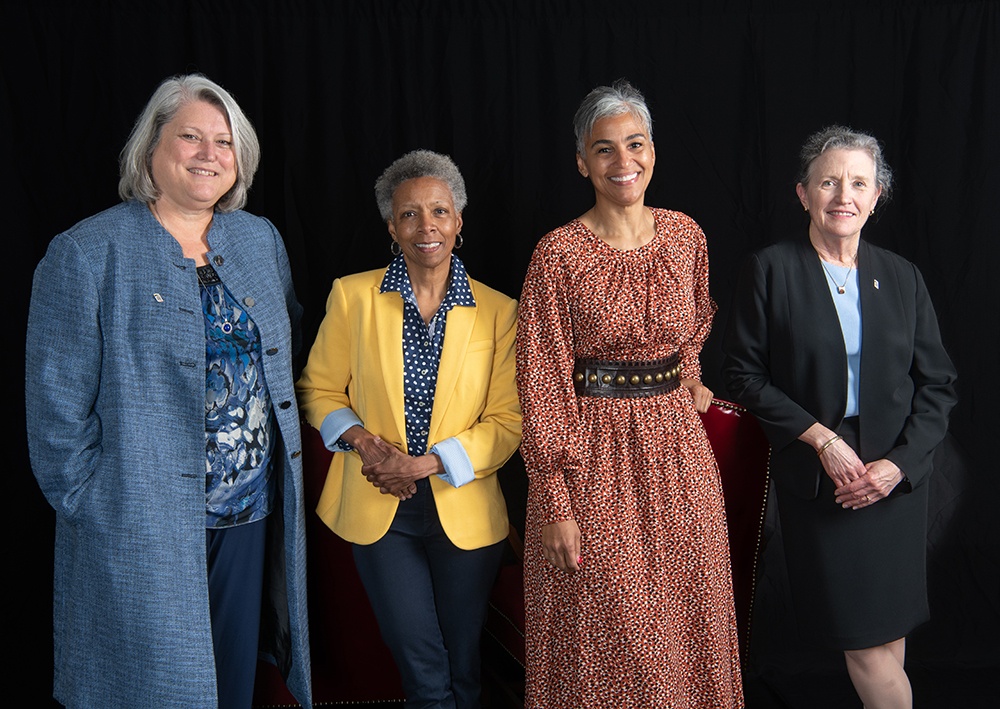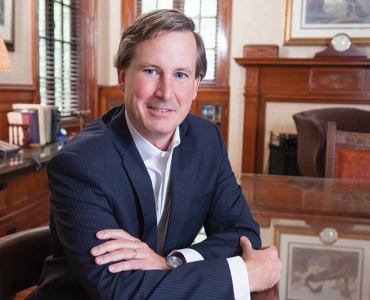
More than half of the deans at the seven schools of the University of Maryland, Baltimore (UMB) are women. This is not an anomaly at UMB — since the second half of the 20th century, women have long held leadership roles at the institution, going back to B. Olive Cole, PharmD, who served as the first woman dean at UMB when she became acting dean of the University of Maryland School of Pharmacy (UMSOP) from September 1948 to June 1949.
Five of UMB’s seven schools have had at least one woman dean, and the University of Maryland School of Nursing (UMSON) has had six, including Jane M. Kirschling, PhD, RN, FAAN, the Bill and Joanne Conway Dean, who will be stepping down at the end of this academic year after a decade.
The current longest-serving dean at UMB, UMSOP Dean Natalie D. Eddington, PhD, FAAPS, FCP, also is stepping down at the end of the academic year and will take on a new role at UMB. Eddington, who became the second African American to earn a PhD from UMSOP in 1999, has served as dean for nearly 16 years.
Judy L. Postmus, PhD, ACSW, became the second woman dean of the University of Maryland School of Social Work (UMSSW) in 2020, months after the COVID-19 pandemic started. Ruth H. Young, PhD, whom UMSSW’s children and family center is named after, led the school from 1977 to 1988.
In 2022, the University of Maryland Francis King Carey School of Law welcomed back Renée McDonald Hutchins, JD, who had previously served on the school’s faculty for 14 years. Hutchins is the third woman to lead the law school, following Karen H. Rothenberg, JD, MPA (1999 to 2009) and Phoebe Haddon, JD, LLM (2009 to 2014).
In addition to UMSON and UMSOP, the University of Maryland Graduate School, which has had several women deans since its consolidation in 1985, and the Health Sciences and Human Services Library, whose first dean — M.J. Tooey, MLS, AHIP, FMLA — retired last year, are currently conducting dean searches.
UMB President Bruce E. Jarrell, MD, FACS, who hired Hutchins and Postmus, said, “I am proud that over half of our deans are women. UMB has stellar examples of strong, successful leaders in Deans Eddington, Hutchins, Kirschling, and Postmus — as well as in recently retired Dean Tooey. With the expertise and leadership of these accomplished women, UMB is better equipped to tackle the challenges of the 21st century and provide an exceptional education to the next generations of health and human services providers.”
CATALYST magazine recently spoke with the women deans at UMB to reflect on their tenures and look forward. One resounding theme from them: Representation in top roles matters, especially to the women studying at UMB who will go on to become future doctors, nurses, pharmacists, lawyers, and social workers.
Natalie D. Eddington, School of Pharmacy Dean
Natalie Eddington was reflective when she assumed the deanship of UMSOP, where she had earned her doctorate.
“I remember sitting in my new office as dean and thinking about my trajectory at UMSOP,” she said. “I started as a PhD student and, after completing my PhD, I worked at Pfizer for two years. Then I received a call from the chair of the Department of Pharmaceutical Sciences at UMSOP stating that he wanted to recruit me for a faculty position. I do not think that I would be a dean without his support.”
Sixteen years later, she will be stepping down at the end of the academic year as UMB’s longest currently serving dean and assuming a new role with the University’s EMBRACE initiative.
“EMBRACE is a multifaceted approach designed to increase the vibrancy of the greater UMB campus and boost UMB’s community. I am excited to stay involved and engaged,” said Eddington, who also will continue as a UMSOP faculty member.
Eddington has overseen many changes at UMSOP, including an increase in the school’s centers, programs, and initiatives: the PATIENTS Program, the Pharmapreneurism initiative, the Center for Research on Complex Generics, the Mass Spectrometry Center, and the Peter Lamy Center on Drug Therapy and Aging, to name just a few.
Over the past eight years, she also has overseen the addition of new dual-degree programs and seven new degree programs such as the first-of-its-kind MS in Medical Cannabis Science and Therapeutics, which launched in 2019.
“We have created a mindset at UMSOP focused on enhancing our academic programing,” she said.
Eddington said the opening of the Pharmacy Hall addition in fall 2010 also was a highlight. “It expanded our footprint and provided new and modern education, practice, research, and workspaces for our faculty, staff, and students,” she said.
Eddington has had several advocates at UMB such as former President David J. Ramsay, DM, DPhil, “who saw in me the potential to be a leader that at the time I did not see in myself. I have had the pleasure of working with others who have supported my decisions and role as dean. I recognize that every day we need to live our core values collectively to ensure a campus that embraces leadership, faculty, staff, and students who reflect those core values.”
Eddington said the next dean will face challenges in the decrease in the number of potential pharmacy students.
“This is a national issue and one that we have seen before,” she said. “The school has developed and implemented several new MS programs to attract a broader group of potential students.”
Eddington said it’s important for women to be represented at UMB in leadership roles because almost three-quarters of its students are women.
“We make better inclusive decisions and are a visible sign to our majority female student body that they can achieve these positions of leadership,” she said. “It’s important to bring all perspectives to the table when the campus workforce and our students have increasingly become more female.”
Jane M. Kirschling, the Bill and Joanne Conway Dean of the School of Nursing
Early in Jane Kirschling’s deanship, she defined what she hoped her legacy would be: to leave UMSON a better place to work and learn, grounded in civility, respect, and inclusion.
“While there is still work to be done to actualize this, I am proud of the progress that has been made through the hard work of UMSON’s faculty, staff, and students,” Kirschling said. “I am also proud of the growth of the nursing student body — when I arrived in January 2013, UMSON had 1,690 students and this fall we had over 2,000 students, with 53 percent of our students across programs identifying as racially and ethnically diverse. This reflects the importance of ensuring that we prepare a nursing workforce that meets the needs of our increasingly diverse communities.”
Kirschling is stepping down at the end of the academic year after leading the school for the past decade. During the COVID-19 pandemic, she led the effort to establish and directed a COVID-19 vaccination clinic at UMB’s SMC Campus Center, where faculty and staff from UMB and the University of Maryland Medical Center worked along with student volunteers to administer more than 40,000 vaccines.
In addition, at the request of then-Gov. Larry Hogan, UMSON launched an innovative “early-exit” option for entry-into-practice nursing students. This allowed students who met requirements for graduation to begin working before their formal graduation to bolster the nursing workforce, which experienced increasing demands for personnel throughout the pandemic. Over four semesters, 614 nursing students began service under this initiative.
Kirschling said UMSON will continue to feel the effects of the pandemic.
“The next dean of UMSON will be challenged by the workforce needs for well-educated nurses at a time when nursing as a profession is still struggling with the challenges in health care post-pandemic,” she said.
Kirschling said she remembers being excited about joining UMB on her first day.
“I had worked with Jay Perman when he was dean of the College of Medicine at the University of Kentucky and I was dean of the College of Nursing and was truly looking forward to working with him as UMB’s president,” she said of Perman, who became chancellor of the University System of Maryland in early 2020.
She said she has felt “fortunate to have worked with women and men in senior leadership roles who truly care about the work of the University and the people who work and learn here.”
“Diversity in the leadership team — and that means diversity of all types, not simply gender — leads to better decisions, since we all bring different perspectives and lived experiences to the table.”
Kirschling said she plans to move to Colorado with her rescue dog, Frankie.
“This will allow me to ‘age in place’ with my family members who live in the area. I’m looking forward to a simpler lifestyle and some quiet time,” she said.
Judy L. Postmus, School of Social Work Dean
Judy Postmus recalls a UMSSW student who approached her after the school’s orientation last fall to thank her for showing her what is possible.
“She now thought differently about her future seeing a female and lesbian dean in a leadership position. She said, ‘I never thought I could be a dean as a lesbian. But you showed me that I could,’ ” Postmus said. “It’s important to represent women so that our female faculty, staff, and student populations can recognize someone like them making decisions and guiding the institution.”
Postmus, who arrived at UMSSW just months into the COVID-19 pandemic in summer 2020, said she has valued her colleagues’ support.
“The president, provost, and fellow deans have welcomed me with open arms. They have provided support and guidance as I navigated changes at UMSSW,” she said. “And the female leaders have especially welcomed me and provide ongoing support. We have laughed together, debated together, and cried together all in a supportive and uplifting way.”
Postmus said it was challenging to start at UMB during the pandemic and work remotely for the first year. “It helps to have other strong female leaders working with me at UMSSW where we can strengthen the culture, post-COVID, to exemplify the core values of UMB and our social work profession,” she said.
She said she’s so far most proud of her justice, equity, diversity, and inclusion (JEDI) work, which included hiring an assistant dean for diversity, equity, and inclusion (DEI), Neijma Celestine-Donnor, MSW, LCSW.
“She took all of the existing assessments and recommendations written by others and created a plan to get them done by the end of 2022 — which she and her team did,” Postmus said.
UMSSW has a standalone course on diversity and oppression, a prerequisite course for all incoming students, DEI trainings, affinity groups, and annual Pulse surveys. Postmus also had a DEI coach her first two years.
Postmus says one of the biggest challenges she faces over the next few years is addressing a drop in enrollment.
“UMSSW had been slowly losing students since 2017, but COVID made things worse,” she said. “The challenge is that there is a shortage of social workers in our city and state and more individuals, families, and communities with behavioral health challenges. We will expect this challenge to last a while and are looking into creative ways to respond.”
Postmus also is overseeing construction of the school’s new building at West Lexington and North Greene streets, which is in the planning stages.
“We want to build a new UMSSW that reflects the values of our school, university, and community,” she said. “The challenge, of course, is to make that a reality in five years. Work is radically shifting as we explore a balance between being in the office and working remotely. And in five years, our online program [starting in fall 2023] should be doing well. The challenge then is predicting what our UMSSW building should include — how many offices, meeting rooms, and classrooms are needed? What does the future of work hold?
“This building will help expand the campus more in a way that allows us to have impact in the community and with our students. I’m really excited about getting a new building.”
Renée McDonald Hutchins, Maryland Carey Law Dean
When Renée McDonald Hutchins returned last summer to Maryland Carey Law, where she had served on the faculty for 14 years before becoming dean of the University of the District of Columbia David A. Clarke School of Law, her priority was to restore the sense of community and belonging she felt the pandemic had affected.
“COVID took a lot out of all of us. Isolation and stress impacted us in so many ways. I have worked very intentionally to ensure that the people who make up this remarkable institution feel seen, heard, valued, and connected,” she said. “I am delighted that even the most skeptical among us report that it is working.
“A colleague told me confidentially during my early days here that they thought my ‘community push’ was pointless. But just a short while ago that same person circled back to tell me that when they now walk in the building the energy feels positively different and they are excited to be in the office again. Getting people reconnected is the first step in building on our tremendous excellence.”
Hutchins said another area of focus has been to communicate the strengths and talent of Maryland Carey Law’s faculty, staff, and students.
“Law schools across the country are seeing dips in applications. In an increasingly competitive market, clearly articulating our excellence will help to ensure that we can continue to recruit and seat the high quality of students, faculty, and staff that we have to this point,” she said. “One of the greatest strengths of this community is its diversity. Ensuring that we continue to land highly qualified classes from a range of backgrounds and experiences will also continue to be work that we lean into intentionally.”
Maryland Carey Law has long supported women, historically ranking No. 1 for women faculty and No. 2 for women students in a survey of American law schools.
“This was the institution where I became an academic. It is the institution where I earned tenure as a faculty member and rose to a leadership position as the head of the Clinical Law Program. The dean who hired me was a woman, and I served under a black woman dean as a senior faculty member here,” Hutchins said. “There is no doubt in my mind that I have benefited from that rich tradition.”
Hutchins pointed out that the University needs to embrace diversity broadly.
“A diversity of perspectives and experiences makes our decisions stronger,” she said. “And it is not enough that we have women in top leadership roles. We must ensure that top leadership is broadly reflective of all of the communities that we serve.”
Hutchins, a Fourth Amendment expert, remembers feeling honored and overwhelmed when she moved into her office.
“I had been in the office so many times before as a faculty member under previous deans. It felt surreal that this time I was walking into the office and it was mine,” she said. “Sitting in the chair for the first time, I suddenly felt the awesome responsibility of ensuring that I would successfully steer this school I love so much.”



